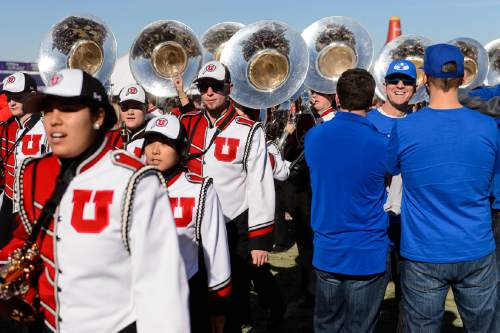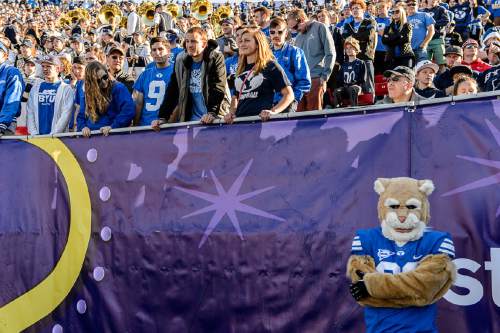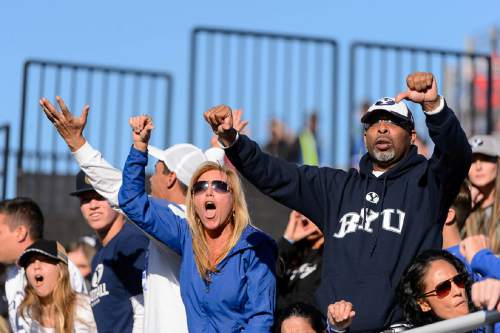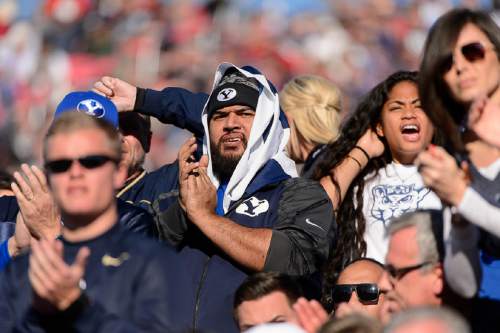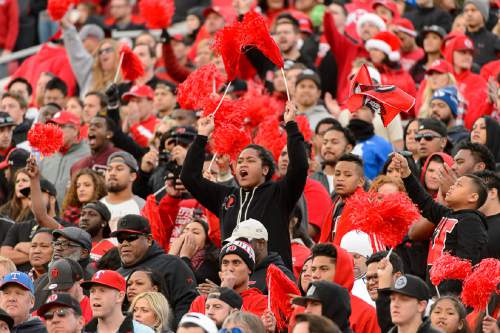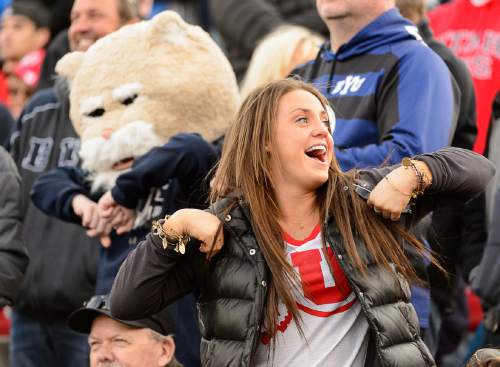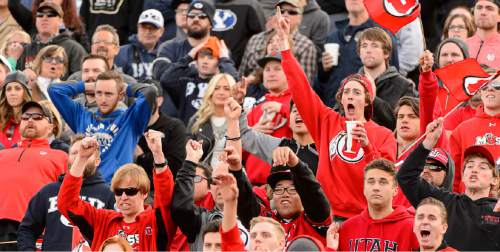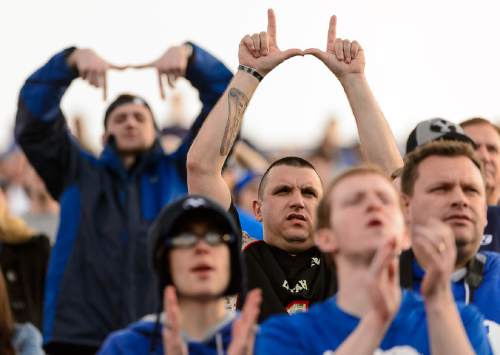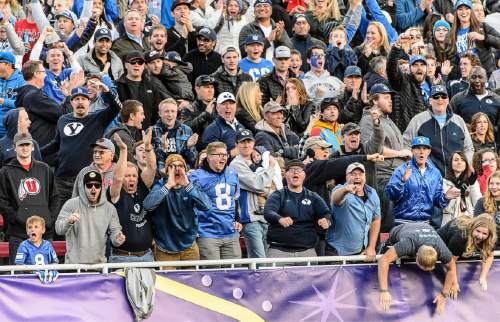This is an archived article that was published on sltrib.com in 2015, and information in the article may be outdated. It is provided only for personal research purposes and may not be reprinted.
During the hours in the run-up to the Las Vegas Bowl, in the tailgating area adjacent to the stadium, there was red and blue everywhere — off to the left, off to the right, and mixed together in the middle. BYU's and Utah's marching bands were blowing their horns and beating their drums, making their rhythmic music. Cougars and Utes were eating and drinking all around.
It seemed … unexpected. Cats and dogs, lions and hyenas, orcas and great whites, cobras and mongooses, chimps and leopards, all together, basking in the warm pregame sunshine.
On a television, the Utah-Duke basketball game was being broadcast from Madison Square Garden, a game that was tight enough to go into overtime, and hundreds of Ute fans huddled around the small screen with numerous BYU fans to watch every possession. People were hooting and hollering, laughing, having a great time.
Utes roared with every successful play, and I swear, I saw many — not all, but many — of the folks dressed in blue cheering for the Utes, as well. There they all stood, shoulder to shoulder, united, if not in their love of Larry Krystkowiak's team, in their dislike for Duke.
It was a nice moment, a moment for hope heading into the future that the Utah-BYU rivalry could be heated and, yet, respectful. That people could root hard for the team of their choice, could love their team, without being jackasses, filled with ill will toward the people who chose to favor the other team.
The good feel wasn't universal. Peering over the shoulder of a Ute, a colleague of mine saw what that person was texting to an unknown recipient. The message read something like this: "I hate these [BYU] guys."
There will always be some zealots wretched by that kind of animosity.
But, in large measure, there was little of that, at least not in that crowd.
Sometimes, a small minority, emboldened by their anonymity, filled with a kind of keyboard courage, mustered in isolation from their hidden-away station behind a computer screen somewhere, give the impression that everybody on one side — the blue or red — loathes everybody on the other. They do the Max Hall thing — they hate everything about the other school. They concede no positive attributes about that other school — not its academics, not any of the educational good it does, not its contributions to the community and society as a whole, and certainly not its football team.
Those angry people make up only a small percentage of the overall fan bases, but they speak loudly and give the false impression that that's the way most people think and act.
On Monday, when new BYU coach Kalani Sitake was asked about the Utah-BYU rivalry, and the fact that the Cougars had lost five straight to the Utes — an edge he himself had helped build as Utah's defensive coordinator — his reply was notable.
He said: "You don't have to say much about the rivalry other than that I've experienced both sides of it, and it's been really fun for me, having been a player here. The rivalry is so close between family members. I had a brother play for Utah when I played down here at BYU. I've got a lot of close friends and we've interacted and we know each other back when I played and right now, currently. The rivalry speaks for itself. It's fun. Being on the other side, there's a lot of similarities between the fan bases, but, more importantly, they're really passionate about their team and I look forward to building good sportsmanship with great competition."
Maybe the holiday season — maybe every season — is a good time to think like Kalani, to put the rivalry in perspective. Among most, it likely already is. Nothing wrong with strong opinions — some of us make a living off of them — and some criticism of both sides here and there, some partisan, aggressive discussion about all kinds of related subjects that can be hashed out and disagreed upon. But any straight loathing should be put away, or, at a minimum, ignored. The anecdotal evidence this past week indicated that insecurity and rancor are not what most people feel or embrace.
There is hope moving forward for the perception and the reality of a strong, passionate blue-red rivalry, without the ridiculous hate a minority — the miserable — love to swing like a hammer.
GORDON MONSON hosts "The Big Show" with Spence Checketts weekdays from 3-7 p.m. on 97.5 FM and 1280 AM The Zone. Twitter: @GordonMonson.


